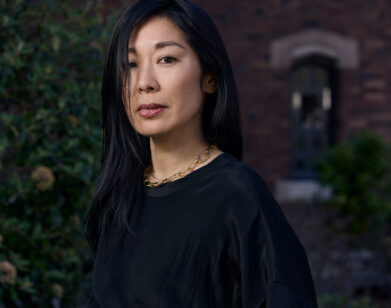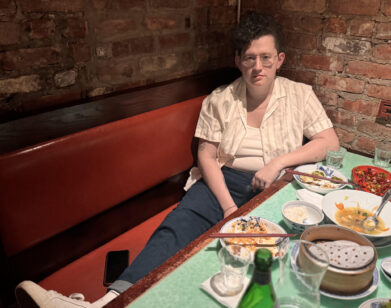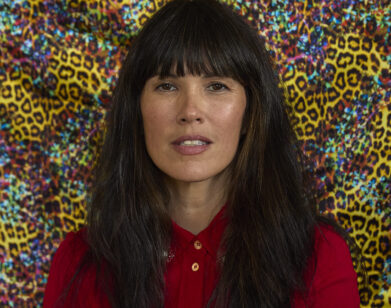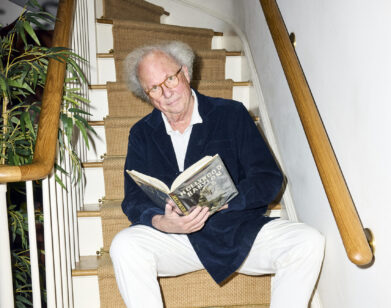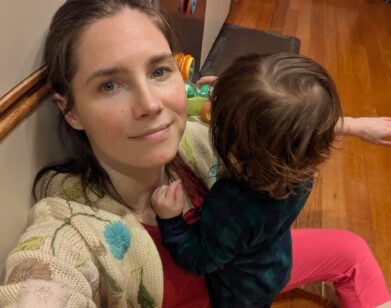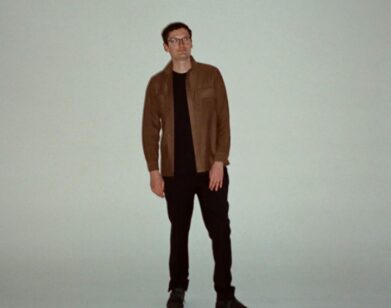DEBUT
From Kashmir to Hollywood, Author Priyanka Mattoo Has Seen the World
Priyanka Mattoo’s memoir, Bird Milk & Mosquito Bones, takes the reader through some of the 32 places she has lived over the past 40 years. “I don’t have a home,” Mattoo writes. In 1989, where the book begins, the insurgencies in the Kashmir region forced Mattoo’s community to flee. Her family home, the place generations of her ancestors had lived, was gone. From there, Mattoo fills the loss with her curiosity about love and life, which she satiates first by studying law, then making films, then working as a talent agent at WME in Hollywood and becoming a production partner to Jack Black. Ultimately, she became a writer.
The first time I met Mattoo, we were in New Orleans for a mutual friend’s birthday. I was immediately captivated and wanted to know more about what seemed like a fascinating life. Bird Milk & Mosquito Bones holds all the answers. It’s wry, touching, warm; it feels like being in the company of your most interesting friend. Once I finished it I wanted to know more about her creative process, so I called her home in Los Angeles to continue our conversation.
———
CLAIRE CAMERON: When we first met, I remember stopping myself from asking you too many questions. I didn’t want to interrogate you.
PRIYANKA MATTOO: I felt like I had known you forever, but I don’t remember you interrogating me in any way. I’ve spent probably the last 20 years of my adulthood not talking about myself, or having a very brisk shorthand for my life. For many years, when people said, “Where are you from?” I said, Michigan.
CAMERON: Michigan?
MATTOO: Yeah, I left it at that.
CAMERON: I think you said that to me, actually.
MATTOO: I did. I don’t think it’s on purpose. I think it’s just a reflex at this point to gauge whether or not people are interested in more information.
CAMERON: I wanted to go deep right away.
MATTOO: I love it when you can meet someone and get right to it. I hate small talk. You hate it, too.
CAMERON: Yes, I hate it.
MATTOO: What does anyone get out of small talk? I don’t understand.
CAMERON: I don’t know, but it reminds me of this beautiful moment at the beginning of your book. When anyone asks if you’re going to go back to Kashmir or what happened to your home, you say your house was burned down by militants.
MATTOO: That’s a lie.
CAMERON: Right?
MATTOO: I mean, it’s the shortest way to tell a version of this story. But it’s embroidered because otherwise, I have to tell a story that took place over ten years. “We lost the house,” that’s what I should say. Sometimes, I just need to get through the pain. So I’ve created a sentence that serves two purposes. It gets across the information that something dramatic happened. It also stops people from asking more.
CAMERON: Is this why you wrote the book?
MATTOO: I wrote the book because of two things. First, my grandmother was diagnosed with Alzheimer’s. After it happened, I remember going into my laptop and writing down everything I could remember about our family. I was terrified that this knowledge would be lost. We come from an oral storytelling tradition and don’t have any written record of what happened in our family. The second reason I started writing is that, if I lose my own mind, I need the stories written down somewhere. I had this Word document with tens of thousands of words.
CAMERON: You kept adding to it?
MATTOO: I kept writing stories. And then, a couple of years ago, something happened in Kashmir. It upset me. We’re always being written about in terms of what happened to us. I need a record, even just for me, selfishly, of who we are as a people, as a culture, as survivors, as people who laugh a lot and eat a lot and enjoy each other’s company. A story, instead of this convenient tale of woe that is politicized by whoever feels like politicizing it. So I wrote an op-ed for The New York Times about love and Kashmir and the summers I spent there.
CAMERON: Do you consider Bird Milk & Mosquito Bones a political book?
MATTOO: No.
CAMERON: Tell me more.
MATTOO: I mean, I’ve grown up being Kashmiri in a context where everyone’s always arguing on your behalf. It’s like being a pawn in a way. Everyone wants to sit down and talk about history and facts: this is what happened, here’s how it happened. And people want to argue about who has a claim to the land, who deserves to be here, and who deserves to be happy, whose pain doesn’t count and whose pain does count. All these conversations have swirled around me my whole life. I have no patience for them because all I have is my feelings about the place and my people. So I don’t consider it a political book. I hope that it’s a personal book.
CAMERON: It feels important, because you talk about the love in your family and how it’s come through your generations. It’s beautiful.
MATTOO: Thank you. When I tell people about the book, the response is always, “Are your parents okay with it? Is your family okay with it?” Because I think it’s really unusual to have written a memoir where the trauma didn’t come from within the house.
CAMERON: That’s a great way to put it.
MATTOO: The trauma was external. The love my family felt and feels for each other—I don’t think it’s unusual, but it’s worth commemorating and celebrating and putting into words. For some reason, for a long time, I thought that wasn’t enough. Why would anyone be interested in reading about how happy we were?
CAMERON: One of the things that is incredibly elegant about your book is the structure. Often, a memoir is chronological or organized by theme, but you tell stories through overlapping years. The picture becomes richer and richer.
MATTOO: The book was originally going to be a series of essays on food and family, because that’s our language. It’s what we had when we had anything go wrong or we moved to a new place or were feeling uncomfortable or sad or happy or whatever. We celebrate with food, we mourn with food, we commune with food.
CAMERON: When I describe the structure of your book, it sounds like I’m describing your approach to cooking.
MATTOO: My mom taught me how to be curious about cooking. Everything was trial and error and experimentation.
CAMERON: And your mom’s cooking advice sounds like writing advice.
MATTOO: We write because we’re curious about so many things. My mom was constantly telling me how fortunate she feels to be interested in so many things. Through all the hard times, whether we’re bored or miserable or in danger, I could make something. I could learn something. I could work. My brain is a source of great comfort. I can turn inward and use that.
CAMERON: One of my favorite passages in the book is when you describe watching a woman eat an entire bottle of ketchup. Many people would just see that and be like, “Gross.” But you had questions. Like, “Did she love the ketchup or just hate the burger?”
MATTOO: I think she loved ketchup. It was a shocking amount of ketchup. Every bite she would put the standard amount of ketchup on the burger and then she would dip it. “Why are you eating that much ketchup?” You can’t ask. You can sit and wonder. You can write about it.
CAMERON: Humor is fundamental to your writing and your outlook in life.
MATTOO: That comes from being an outsider. That’s showing up to a million places and having to observe so closely so that I understand how to be. I have probably learned to break down behavior as data points. My husband is a comedy writer. Jokes are his craft. We talk a lot about why things are funny and we laugh a lot at my house. But when something really tickles us, we’ll be like, “Why is that funny?”
CAMERON: That’s a great preoccupation to share. You wrote about this conversation between your dad and your husband during the preparations for your wedding. And there was an agreement that there would be no swastikas on the wedding program. The swastika, of course, is a Hindu symbol. That’s a great example of your humor.
MATTOO: You go to India and you’ll see swastikas everywhere. There are millions of people in India who have no idea that the swastika is the worst example of cultural appropriation.
CAMERON: And you made it into this beautiful opening to an essay about your wedding. You also write about your cross-cultural relationship and how you’re raising your children in English.
MATTOO: Yes, yes, we are. I would love for my kids to be familiar with Kashmiri because I love the language. Hopefully, there will be ways for them to familiarize themselves with it. They’re around my parents who speak it, but English is our language. Ultimately, it came down to letting them love one language. Let them play with one. They love to tell a story and they love to make a joke, so let them get that facility in one language before they branch out and find their own, which I think they will.
CAMERON: There is a Kashmiri saying in your book I will never forget. “I’d remove your thorns with my eyelashes.”
MATTOO: There’s so much violence and a fierce love in it. Love is not gentle. Love is, “I would give my life for you. I would give my comfort for you. I would give my bodily autonomy for you.” Over millennia, there has been so much dispute. We were invaded by gangs of marauders for our entire history and in a million different ways. And I think, for that reason, we’re insular, but we’re so fiercely protective. And our language reflects that. We don’t say, “I love you.” In Kashmiri, we say “I would die for you.” Kashmiri expressions of love tend to be action-oriented because of the political climate through our entire history. Growing up in a very political climate, you learn to distrust words. Anyone can say “I love you,” but it’s action that matters. What would you do for me? Would you inconvenience yourself for me? Would you put yourself in danger for me? That’s love.
CAMERON: Can you tell me about the phrase “bird milk and mosquito bones?”
MATTOO: I needed something that represented my culture. I talked to family members. I went through old texts of colloquialisms and idioms. This phrase kept coming up and I just loved it.
CAMERON: Everything in your life has led up to this book, hasn’t it?
MATTOO: The book is about the place. It’s about home. It’s about a wound that has never healed because I still see it every day in the world. I see it in people, people who are unable to see the humanity in the other side. I learned very early on that there are no bad guys and good guys. There are just people trying to survive.
CAMERON: A therapist said something to you, that pain is passed down until someone has the bandwidth and resources to feel it. Was that part of writing this book as well?
MATTOO: Yes. I learned through writing what I carry and what generations of people before me have carried. I have to lay down this burden for us. I have to talk about it. We cannot carry this around any longer. We have to process this and we have to move on and make sure that our kids understand that people have more commonalities than differences.
CAMERON: Will your children ever see Kashmir?
MATTOO: They will. If I could take them next month, I wouldn’t be ready to go. My parents have been and they ask me sometimes, “why don’t you come with us?” They were adults when they left. They were adults when all this happened. They felt it. They felt the loss in a different way than I did. I was a child, so I am not ready. I might be someday, but I’m not. At some point, I will be.
CAMERON: I hope you write that book.


